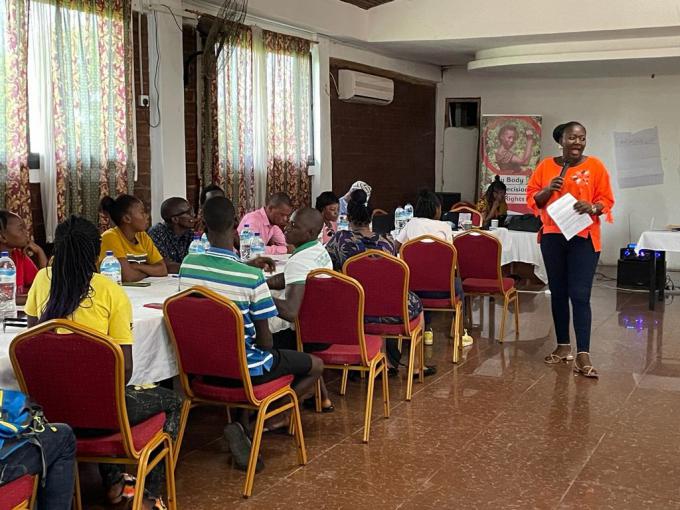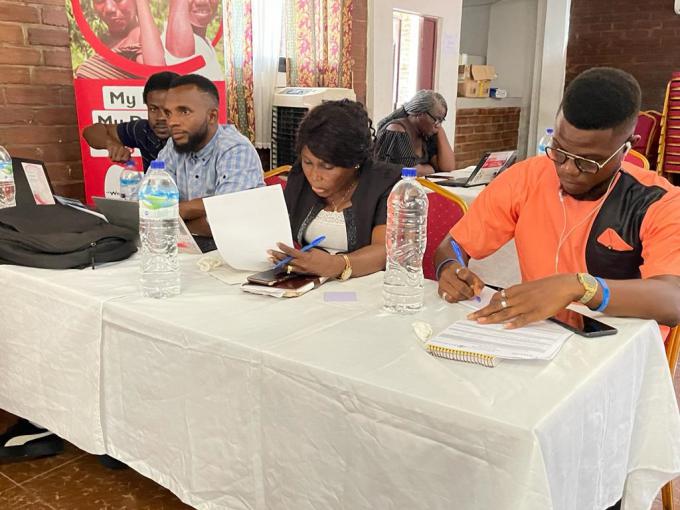Ownership and collaboration are key to winning the fight to end child marriage
By Ramatu Jalloh, Advocacy and Communication Director - SCI Sierra Leone

Aminata Kamara, Gender Specilist making a statement during the engagement. May 2023. Photo Credit; SCI
In April (27-31) Save the Children held a three-day meeting with 59 beneficiaries of the Child Early and Forced Marriage project, commonly known as CEFM. Funded by Global Affairs Canada with support from Save the Children Canada, this three-year project in Kailahun and Western Area Rural districts, aimed to address social and gender drivers that contribute to the high rates of child early forced marriage and teenage pregnancy; through strengthening institutional structures, working with community leaders to establish and enforce local laws as well as build the knowledge base of children and youths in communities. This has emboldened them to not only raise awareness on the impacts of child marriage and teenage pregnancy thereby challenging status quo but also empowered them to change their lives and their communities.
Attended by representatives from Ministry of Gender and Children's Affairs, the Ministry of Health, the Family Support Unit, the head of Paramount Chiefs, child and gender champions, the meeting was a truly inspiring moment for all present when different groups and speakers shared stories of change for hundreds of girls and numerous communities in both districts. The fact that government personnel spoke to initiatives they have taken to protect girls was a true testament of change.
Stories of change
Change is important to enhance not only effective collaboration among national and district stakeholders but also for girls who are affected as well as their communities. In just three years of implementation, CEFM has transformed the lives of 4,490 adolescent girls across the two districts.
Here is what the different groups had to say about the changes they have seen and contributed to.
Adolescents share a story from one community: *Mary (not her real name) dropped out of school at the age of 16 when she fell pregnant. She could not go back to school after giving birth because her father is a farmer and could not afford to pay for her to return. She was feeling discouraged and hopeless. Through CEFM, Mary was enrolled in the safe space and encouraged to join VSLA. As an active member, she took a loan and started petty trading. Mary made some profit from her sales and decided to use this to pay for her return to school. She also gave some of this money to her mother as ‘business money’ to support to her as well as ensure they continue to participate in the VSLA. Mary is now attending Senior Secondary School in Kenema. She is a class prefect and dreams of becoming a nurse to serve her community.

Government partners speak of changes and initiatives: Representatives spoke boldly about what has changed since CEFM in Kailahun and Western Area Rural districts. This includes prompt response to gender-based violence cases by traditional authorities, an increase in the reporting of child marriage cases to Family Support Unit and stronger collaboration with other departments and community leaders. Since the beginning of the project in June 2020, Kailahun has recorded 312 GBV cases of which 227 victims are age 12-17 years. The ministry attributes to high rate of cases to increased awareness leading to more reporting.
As a result of the level of community awareness and request for services, the Family Support Unit in Waterloo took the initiative to set up two new police posts in vulnerable, hard to reach communities without funding from the national Police. Thanks to their initiative they were able to prosecute two cases of extreme violence against children which would have otherwise gone unreported. It has emboldened commitment by groups established in these communities to not only follow up cases but create alternative community care for vulnerable children in the absence of nationally approved protection services.
Looking to the future
With inspiring stories of change and action, the question now is whether government, community members and girls will continue the momentum after the project ends this year. Despite concerns expressed by some there are glimmers of hope of sustaining the gains made under CEFM. Traditional and Religious leaders are now champions leading the fight against child marriage in some communities, while government and district stakeholders have set up WhatsApp groups to address emerging issues and enforce the new Kailahun bylaws to end child marriage and gender-based violence. The Ministry of Gender successfully lobbied for female police officers for the FSU in the district to deal with sensitive gender-based violence cases affecting children while Police officers have been trained on referral pathways and now work closely with social welfare and social workers.
My take away from the meeting is hope. The level of ownership and collaboration demonstrated leaves me feeling optimistic not only for the gains made for girls in Sierra Leone and I look forward to what is possible through institutional change and community action.
 Sierra Leone
Sierra Leone